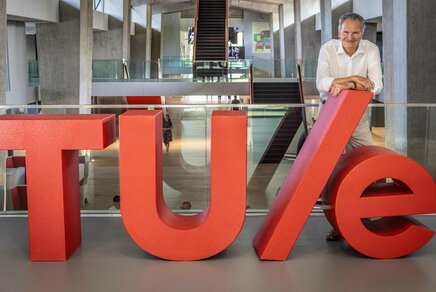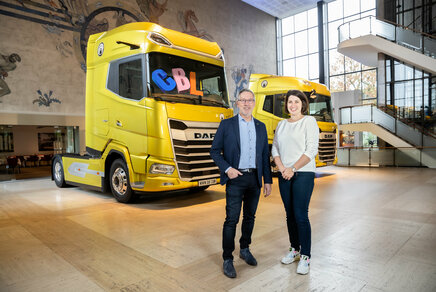TU/e is known for its high percentage of co-publications of scientific articles together with industrial partners. This is a good indicator of its close scientific cooperation with the high-tech industry, especially in the Brainport region. But TU/e collaborates with industry in many more ways.
Strong partners
TU/e has a unique position as a university in that the region has a very high concentration of extremely successful high-tech multinationals, including big names like ASML, Philips, DAF, NXP, Signify, VDL and Thermo Fischer Scientific. Many of these are global market leaders in their fields. TU/e is proud to have intensive, successful and long-term collaboration with all of these top companies.
In addition, TU/e collaborates with many companies from outside of the region. And of course, the university also works closely with its own spin-offs, startups and scale-ups, such as Prodrive Technologies and Smart Photonics.
In total, TU/e collaborates with many dozens of companies. Our annual report contains a complete list of companies that directly support TU/e research financially.
Scientific co-publications with industry
For more than a decade, TU/e has been in the top 10 of the CWTS Leiden list that ranks universities according to their research collaboration with industry based on scientific co-publications. Together with researchers from industry, the research work of TU/e academics leads to hundreds of peer-reviewed scientific publications each year.
Publications with industry account for approximately 15% of TU/e’s total research output. This makes it a substantial and highly valuable component. At the same time, this percentage shows that TU/e’s research portfolio is balanced. In addition to research with industry, a lot of research is performed in collaboration with other universities, with societal actors such as hospitals or by groups of TU/e academics alone.
TU/e research with industry is high quality. According to an academic study on doctoral research performed with industrial partners, this scores better than research without companies in most respects. Among other things, it leads to more publications in scientific journals and creates more patents.
Startups and spin-offs
In addition to existing high-tech internationals, TU/e also works intensively with its startups and spin-offs.
TU/e is an important breeding ground for new entrepreneurship. Many dozens of companies originate at TU/e due to a unique combination of factors. TU/e brings together many smart, innovative and entrepreneurial students and researchers from all backgrounds. There is a relentless flow of new, groundbreaking knowledge and technology, as well as top-notch education with a lot of attention to entrepreneurship. The university and Brainport offer an environment that supports tech startups in all areas. The Gate, the help desk for tech startups in the Brainport region, plays a central role in this.
The university remains in close contact with its startups in order to contribute to the optimal development of the companies. This naturally includes conducting joint research to continue to push boundaries together in terms of knowledge and technology and to ensure long-term earning power.
A good example is the spin-off Smart Photonics, which is now a strategic collaboration partner. Other examples include Xeltis, RIFT and Cellsius. For a full overview of current TU/e participations in spin-offs, please visit this page.
Professors from industry
The cross-fertilization with our industrial partners is achieved, to a large degree, via part-time professors from industry. These are top researchers from companies who, in addition to their main appointment, also have an appointment as a TU/e professor, usually for one day a week.
These part-time professors are lynchpins of collaboration. They bring in expertise and relevant scientific questions, provide research proposals together with colleagues, supervise (PhD) students and coordinate between the company and the university. They stand at the foundation of the scientific knowledge and innovations that provide future earning power for our industrial partners.
We are proud of our approximately 25 professors from industry, from companies such as ASML, NXP and Philips. A complete list of TU/e professors from external organizations can be found here. Incidentally, there are also several dozen part-time professors at TU/e from societal organizations, such as hospitals. All of this underscores TU/e’s interconnection with the community, which is focused on making a maximum contribution to society.
Expressed in FTE, part-time professors from industry account for slightly more than 2% of all TU/e professors. This is small in percentage terms, but enormous in significance as these professors have such a crucial role in the cross-fertilization between the university and the high-tech industry.
Part-time professors are always embedded in a research group. Their appointments in principle have a five-year term, extendable if necessary.
Challenge-Based Learning
There is also intensive collaboration with industry in education. TU/e is a forerunner in the field of Challenge-Based Learning (CBL). Among other things, the university won the first Dutch Higher Education Award for this. At various points during their studies, multidisciplinary teams of TU/e students set to work on challenges from the world around them, with issues that often come directly from business but also from society or academia. The parties working on these issues in practice are actively involved in education and, in many cases, from the high-tech industry. Even before starting their careers, students therefore build a bridge between technology and the world around them.
Student teams
Many TU/e students organize themselves into teams in order to sink their teeth into societal challenges. Every year, dozens of teams start up, some of which become exceptionally successful. A well-known example is Solar Team Eindhoven, which has won the Bridgestone World Solar Challenge four times. And student teams often eventually lead to startups. Well-known examples include Lightyear, ELEO and DENS.
A success factor for the teams is the fact that regional industrial partners are willing to work with them on the development of the technology. This also demonstrates the strong collaboration with industry.
Hybrid teachers
Hybrid teachers are highly educated employees from the high-tech industry who enrich courses at TU/e with their knowledge and experience. They give students insight into how industry works, how it moves from challenge to solution and how theory is converted into practice. This offers students not only enriching insights but also a better view of their possible future working environment. TU/e currently works with about 120 hybrid teachers and that number is expected to grow considerably.
Participating companies see the concept of hybrid teachers as an opportunity to offer employees something extra and to give something back to society by imparting knowledge and enthusiasm for technology.
Read more about hybrid teachers in this article.
Main supplier of engineers in Brainport
As many as 82% of engineers educated at TU’s in the Netherlands and working in the Brainport region come from TU/e. This makes the Eindhoven university the main supplier of highly trained engineers to this economically strong region. In addition, TU/e has the highest stay rate in The Netherlands of international graduates (source: Nuffic). A major part of them find a job in the region.
Eindhoven Engine
Eindhoven Engine is an important facility in regard to collaboration and TU/e has an important stake in it. Eindhoven Engine facilitates innovation projects by bringing the right companies, knowledge institutions and students together, providing co-location space and funding, among other things.
Our stories about cooperation with industry


Contact
-
Ivo Jongsma (Spokesman)
